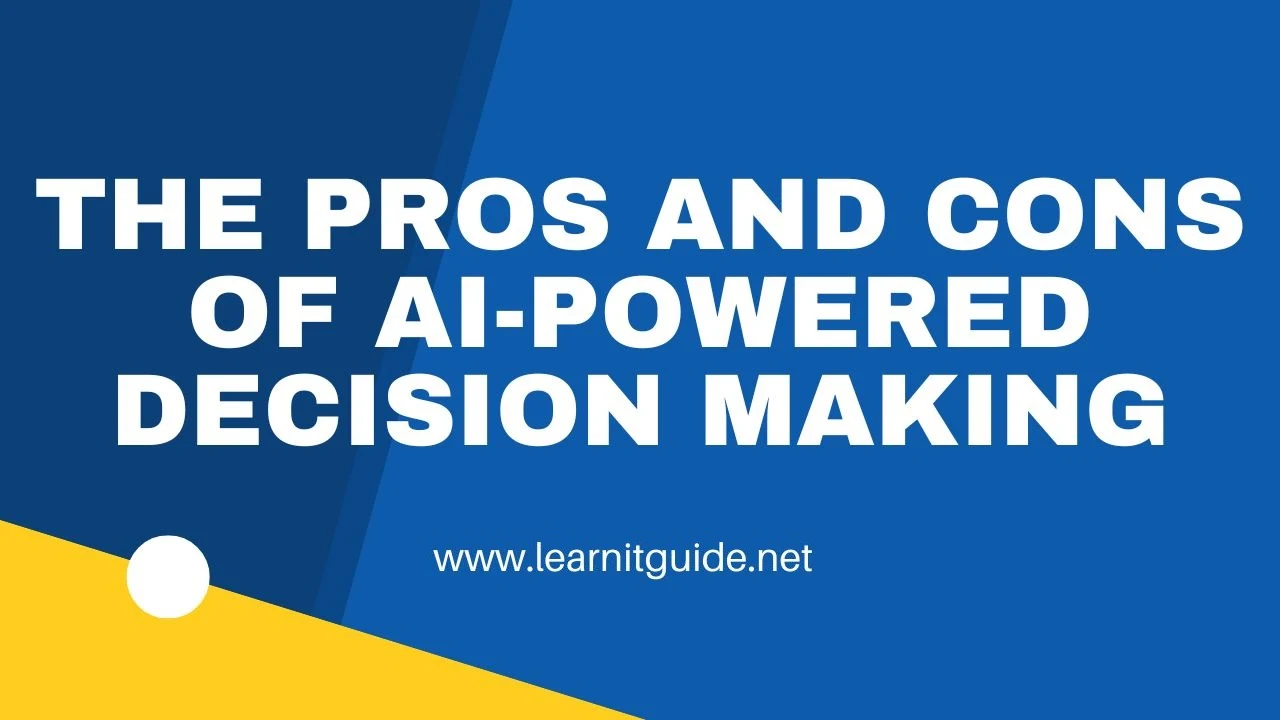This post will help you to understand about The Pros and Cons of AI-Powered Decision Making.
If you are interested in learning, Request you to go through the below recommended tutorial.
DevOps Full Course Tutorial for Beginners - DevOps Free Training OnlineDocker Full Course Tutorial for Beginners - Docker Free Training Online
Kubernetes Full Course Tutorial for Beginners - Kubernetes Free Training Online
Ansible Full Course Tutorial for Beginners - Ansible Free Training Online
Lets Get Started.
The Pros and Cons of AI-Powered Decision Making
Introduction:
The term “Artificial Intelligence (AI)” refers to the ability of a computer or machine to perform tasks that typically require human intelligence such as visual perception, speech recognition, decision-making, and language translation. AI-powered decision making is the utilization of AI algorithms to provide insights and make decisions based on data inputs.
Pros of AI-Powered Decision Making:
Increased Efficiency and Speed
One of the main benefits of AI-powered decision making is the increased efficiency and speed of decision-making processes. Unlike humans, AI algorithms can process large amounts of data and make decisions in real-time. This is particularly beneficial in industries where time is of the essence such as finance, healthcare, and emergency services.
Enhanced Accuracy
AI algorithms are designed to learn from past data and make decisions based on patterns and trends. This means that AI-powered decision making has the potential to be more accurate than human decision-making, which is often prone to errors, biases, and emotions.
Increased Objectivity
AI algorithms are not influenced by personal biases, emotions, or individual opinions, which can be major sources of error in human decision making. This means that AI-powered decision making has the potential to provide more objective and impartial results.
Improved Insights
AI algorithms can process large amounts of data and uncover hidden patterns and insights that would be difficult or impossible for humans to discover. This can help organizations make informed decisions based on a broader and more comprehensive understanding of their data.
Cons of AI-Powered Decision Making:
Lack of Flexibility
AI algorithms are programmed to perform specific tasks and make decisions based on specific rules and parameters. This means that they are not as flexible as human decision makers, who can take into account a wide range of factors and adjust their decision-making processes accordingly.
Lack of Creativity
AI algorithms are designed to make decisions based on existing data and patterns. They are not capable of coming up with new ideas or innovative solutions. This means that AI-powered decision making may not be suitable for creative industries such as marketing and advertising, where innovation and originality are key.
Bias in Data
AI algorithms are only as accurate as the data that is fed into them. If the data used to train an AI algorithm is biased or incomplete, the decisions made by the algorithm will also be biased or incorrect. This is a major concern in industries such as criminal justice, where AI algorithms are used to make decisions that have significant impacts on people’s lives.
Dependence on Technology
AI-powered decision making relies on technology and algorithms that are beyond the control of human decision makers. This means that organizations may be vulnerable to technological failures or hacking, which could result in incorrect decisions or data breaches.
Conclusion:
AI-powered decision making has the potential to provide organizations with faster, more accurate, and more objective decision making. However, it is important to consider the limitations of AI technology and the potential for bias in data inputs. Organizations should carefully assess the suitability of AI-powered decision making for their specific needs and put in place robust processes to ensure that decisions made by AI algorithms are trustworthy and reliable.
That’s it for this post, Hope you have got an idea about The Pros and Cons of AI-Powered Decision Making.
You can also refer similar links below on Artificial Intelligence topics.
AI and the Environment: Opportunities and Challenges
How AI is Changing the Landscape of Business and Marketing
AI in Education Enhancing Learning and Teaching
AI and the Future of Humanity Opportunities and Threats
How to Become an Artificial Intelligence Engineer
Keep practicing and have fun. Leave your comments if any.
Support Us: Share with your friends and groups.
Stay connected with us on social networking sites, Thank you.







0 Comments